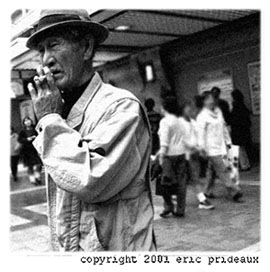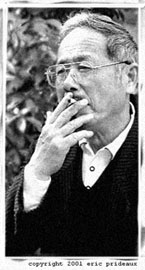Up in Smoke: Kicking the Habit in Japan
Question 1: Do you smoke to relieve stress? I leaned back in my chair and ran my right hand through my hair. My pack sat next to the examination sheet on my desk. Lighter and ashtray dutifully waiting beside. I set my pencil down and rolled both sleeves of my white shirt to my elbows. I then noticed that the room temperature had risen considerably since I had begun.
 Junior reporter Junko's oyaji examination I knew would be a difficult task. In addition to tobacco use, I expected questions concerning the subtleties of chasing young girls, various social practices (spitting, public urination, etc.), and golf course frequency as being critical items in the determination of whether I indeed share characteristics similar to those of that of the stereotypical middle-aged Japanese male. However, I didn't anticipate it being quite so cyclical. Relieve stress?
Junior reporter Junko's oyaji examination I knew would be a difficult task. In addition to tobacco use, I expected questions concerning the subtleties of chasing young girls, various social practices (spitting, public urination, etc.), and golf course frequency as being critical items in the determination of whether I indeed share characteristics similar to those of that of the stereotypical middle-aged Japanese male. However, I didn't anticipate it being quite so cyclical. Relieve stress?
With perspiration ponding in my hands, I cupped them together into a bowl-shape and blew inside. I turned my head and stared at the pack. Be sure not to smoke too much, the package's sole warning warned.
I returned my eyes to the examination page. The first rule of taking exams - answer the ones you are sure of first - began calling to me. I moved on - Question 2: On average how many cigarettes do you smoke in one day? I loosened my tie and arched my chin upward, running the handkerchief from my shirt pocket over the back of my neck while my veins bulged in front. Cigarettes in one day?
I knew that formulating an answer wasn't going to flow as freely as the sweat beads running down my back. There were, of course, a number of critical factors to consider; alcohol consumption that day, alcohol consumption the previous day, projected alcohol consumption the following day...
My hand started to move toward the box, but paused. I instead merely glanced. Be sure not to smoke too much. I barked into the newsroom, "Junko, why is it hotter than Satan's bollocks in here?" I grabbed my pencil and gripped it tightly.
"Can't get past the first question can you?" she called back from the newsroom. I again slowly extended my fingers for my pack. But instead of genesis, Junko appeared in my doorway holding a stack of documents. I slowly withdrew while staring at her.
"Why don't you light one up then?" she asked. "Didn't you know that one of the benefits of smoking is that it boosts concentration?"
"Is that right?" I stretched both of my arms. "Well," I yawned, "I know it's the best way to free up seats on the subway. Where'd you hear about this concentration business?"
"Some papers recently ran a feature about tobacco shop owners in Machida making such claims. It's all here." She tossed a report onto my desk.
Just then I remembered rule number two of test taking - procrastinate as necessary - and retrieved a smoke from my pack with authority before beginning to read.
A pack of smokes in Japan tells the prospective user solely to know when to say when: Be sure not to smoke too much. While this may seem rather mild in comparison to the U.S. Surgeon General's warnings about lung cancer, heart disease, and birth defects, Japan has recently tried to slowly increase its efforts to inform its citizens of the hazards of lighting up. There have been some small victories. But other battles have proved to be about as easy as instituting bank loan reform.
 Japan Tobacco (JT), Japan's domestic cigarette manufacturing monopoly, estimated, as the Asahi Evening News reports, that 53.5 percent of Japanese men and 13.7 percent of women were considered smokers in 2000. This represents a 0.5 and 0.8 percent drop respectively over the year before. Why a drop? The economic recession?
Japan Tobacco (JT), Japan's domestic cigarette manufacturing monopoly, estimated, as the Asahi Evening News reports, that 53.5 percent of Japanese men and 13.7 percent of women were considered smokers in 2000. This represents a 0.5 and 0.8 percent drop respectively over the year before. Why a drop? The economic recession?
Recent research into cigarette sales follows this decrease in the number of smokers in Japan. The Tobacco Institute of Japan, Kyodo reports, said that 324.5 billion cigarettes were sold in Japan in fiscal 2000, a decrease of 7.7 billion from the previous year in the second consecutive yearly fall. The institute credited/blamed the decrease on price increases instituted by JT and the stagnant economy. Others, though, think Japanese people are simply being encouraged to put away their lighters.
In an effort to curb smoking, "The town of Fukaura in Aomori Prefecture," the Asahi continues, "made a startling move last month by discussing an ordinance to curtail the number of cigarette vending machines outdoors." Perhaps more startling though was domestic airline Air Do's nearly unanimous rejection by passengers of its plan to add smoking seats to some flights last year. Further, non-smoking coffee chain Starbucks has been smoking the competition since it opened its first Japanese store in 1996 (though admittedly this also could well be a reflection on the state of Japanese coffee). While this may seem optimistic for the non-smokers' fight, to claim significant inroads would still be premature. There have been roadblocks.
In April, Kyodo reports, of the twenty-seven prefectures in Japan that compile regional health plans, only seven included specific antismoking goals. Additionally, "Pressure from the tobacco industry has led a number of prefectural governments to abandon or downsize their antismoking campaigns." Such was the case in Itami City in Hyogo Prefecture when it decided to be smoke free within 10 years. After getting wind of this JT, in a statement, demanded that the city snuff the idea, saying, "We cannot accept something that completely negates smoking." Anti-tobacco organizations too have cast their vote on the issue as well.
A tobacco information organization in Chiyoda Ward said in an open letter in April concerning the then upcoming election for Prime Minister, "Three of the candidates, Mr. Hashimoto, Mr. Kamei, and Mr. Asao, are smokers. Only Mr. Koizumi is not. We cannot find any country which has a smoking president. The World Health Organization is trying hard to decrease tobacco-related illnesses. If the top leader of Japan smokes, Japan would be a laughing stock." Fears of being laughed at can be put to rest. Koizumi was the victor. Can non-smokers relax a little? Not exactly.
Early this month scientists at the Aichi Cancer Center in Nagoya said that one can reduce the possibility of lung cancer as a result of smoking. How? Get your pack, lighter, and wasabi ready. Reuters reports that the scientists "believe sushi and fresh fish are the reason lung cancer rates in Japan are markedly lower than those in the United States and Britain." The scientists are quick to warn, however, that they "are not sure how fresh fish helps to lower lung cancer risk in smokers but suspect it is due to polyunsaturated fatty acids present in fish oil." But the non-smoking lobby is going have to chew on more than fat. There are the benefits to smoking as well. What? Didn't know there were benefits?
The Machida Tobacco Retailers Association in Tokyo's Machida City recently unearthed hitherto unheard of benefits of the habit. In response to an article printed in the January newsletter by the Machida Public Health Center, which listed the negative effects of lighting up (cancer, loss of senses, and high cost), the Yomiuri Shimbun reports, the association insisted the article was unfair as it "only focused on the hazards of smoking, but did not mention its benefits, such as boosting concentration and promoting communication."
When contacted for comment about the incident, Machiko Yamaguchi, section manager of the health center's planning department, said that she has since only received a letter from the president of the Cigarette Commerce Association of Tokyo, demanding to know where the health center received their information about the negative side effects caused by smoking. "We informed him," Yamaguchi said, "that our information was from the publication 'Leave the pack behind' issued by the World Health Organization." JT and the Machida Tobacco Retailers Association could not be reached to discuss the claimed benefits. Yamaguchi added, "We've received about 30 encouraging comments by phone, fax and e-mail from the public so far. Not one discouraged the stopping of smoking."
 So indeed some folks are in favor of Japan stubbing out its cigarettes. Time will only tell if they have the necessary concentration to continue the fight. But what does the future hold?
So indeed some folks are in favor of Japan stubbing out its cigarettes. Time will only tell if they have the necessary concentration to continue the fight. But what does the future hold?
The Asahi says, "According to a JT official, the company has no projection on the future of tobacco consumption nor has it assessed the financial effects of the trend to quit smoking." But JT concedes, "We would like to see a society in which smokers and nonsmokers can coexist."
And, I suppose, one where sushi shops will one day begin filling doctors' prescriptions.
I took a long and satisfying final drag on my cigarette and tossed it into my tray. I glanced at my framed Eisenhower wall portrait, smiled, and returned my focus to my examination sheet. I then proceeded to concentrate on the task at hand.
In mere minutes, I whipped through the true/false section about necktie fashion, I calculated the urination and spit volume averages with ease, I utilized Fourier Transforms to solve the inebriated passenger capacity hypotheticals for late night trains, and I even completed the section about smoking. I handed Junko my test sheet.
After a few brief moments of whipping around a red pen, she declared, "Perfect score!" I smiled and tapped my desk with my pencil. "I knew you could do it. You are positively an oyaji!"
"Well," I said, "we all have to fit some category. Some of us smokers..." I slowly extended my hand towards my pack to lull her into submission. "Some drinkers..." I then quickly made a ninety-degree change of direction for my coffee cup. I grasped hold and looked up at her. "Some even coffee drinkers..." At that, she bounced back to the newsroom like a sprung jack-in-the-box at a kid's birthday party, effectively stubbing out my implied request.
Smoking may increase concentration but its ability to enhance communication remains seriously in doubt.
Note: Eric Prideaux and Nobuko Chuma also contributed to this article.

